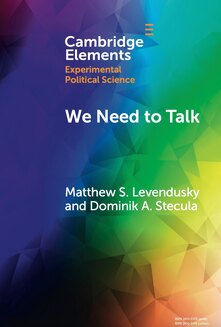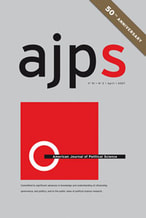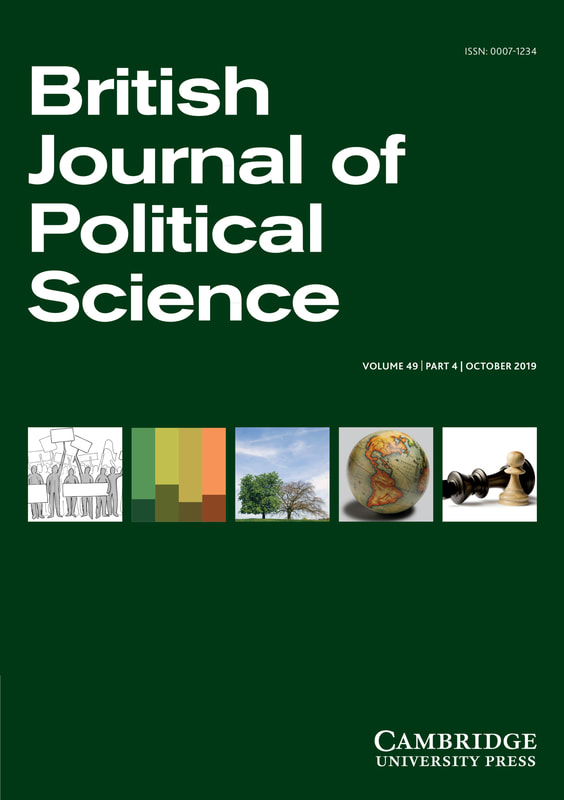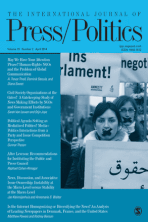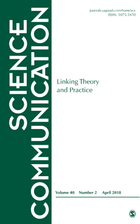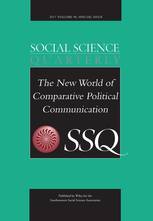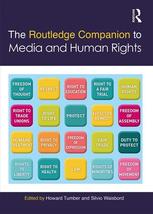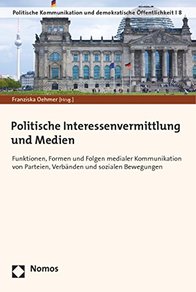Snapshot of my academic work:
- My CV is here.
- My Google Scholar profile is here.
- My ResearchGate profile is here.
- My ORCID profile is here.
- My MediaWell profile is here.
- My Sage Policy Impact profile is here.
|
PUBLICATIONS
Book (1) Levendusky, M. and Stecuła, D.A. (2021). "We Need to Talk: How Cross-Party Dialogue Reduces Affective Polarization" Cambridge University Press, Cambridge Elements in Experimental Political Science series. |
Peer-Reviewed Journal Articles
(25) Fitz, E.B., Stecuła, D.A., Hitt, M.P. and Saunders, K.L.. "Objective numeracy exacerbates framing effects from decision-making under political risk," Nature Scientific Reports 14, 10473.
(24) Warner, S.B. and Stecuła, D.A. (2024). "PhD stipends and program placement success in political science," Research & Politics, 11(2).
(23) Motta, M., Hwang, J. and Stecuła, D.A. (2023). "What Goes Down Must Come Up? Pandemic-Related Misinformation Search Behavior During an Unplanned Facebook Outage" Health Communication.
(22) Motta, M., Motta, G. and Stecuła, D.A. (2023). "Sick as a dog? The prevalence, politicization, and health policy consequences of canine vaccine hesitancy (CVH)" Vaccine. https://doi.org/10.1016/j.vaccine.2023.08.059
(21) Motta, M. and Stecuła, D.A. (2023). "The Effects of Partisan Media in the Face of Global Pandemic: How News Shaped COVID-19 Vaccine Hesitancy" Political Communication. https://doi.org/10.1080/10584609.2023.2187496.
(20) Pickup, M., Stecuła, D.A. and van der Linden, C. (2022). "Who Shares Conspiracy Theories and Other Misinformation about Covid-19 Online: Survey Evidence from Five Countries" Journal of Quantitative Description: Digital Media, 2. https://doi.org/10.51685/jqd.2022.024.
(19) de Rooij, E. A., Stecuła, D.A. and Pickup, M. (2022). "Populist Media Diets" Social Science Quarterly.
(18) Stecuła, D.A., Motta, M., Kuru, O. and Jamieson, K.H. (2022). "The Great and Powerful Dr. Oz? Alternative Health Media Consumption and Vaccine Views in the United States" Journal of Communication.
(17) Kuru, O., Chan M.S., Lu, H., Stecuła, D.A., Jamieson, K.H. and Albarracin, D. (2022). "Religious affiliation and philosophical and moral beliefs about vaccines: A longitudinal study," Journal of Health Psychology.
(16) Motta, M. and Stecuła, D.A. (2021). "Quantifying the effect of Wakefield et al. (1998) on skepticism about MMR vaccine safety in the U.S.," PLOS ONE.
(15) Stecuła, D.A. and Pickup, M. (2021). "Social media, cognitive reflection, and conspiracy beliefs," Frontiers in Political Science.
(14) Kuru, O., Stecuła, D.A., Lu, H., Ophir, Y., Chan, M., Winneg, K., Jamieson, K.H. and Albarracin, D. (2021). "The effects of scientific messages and narratives about vaccination," PLOS ONE.
(13) Stecuła, D.A. and Pickup, M. (2021). "How populism and conservative media fuel conspiracy beliefs about COVID-19 and what it means for COVID-19 behaviors," Research & Politics.
(12) Lee, N.R. and Stecuła, D.A. (2021). "Subnational Bipartisanship on Climate Change: Evidence from Surveys of Local and State Policymakers," Climatic Change.
(11) Stecuła, D.A., Kuru, O., Albarracin, D., and Jamieson, K.H. (2020). "Policy Views and Negative Beliefs About Vaccines in the United States, 2019," American Journal of Public Health.
(10) Pickup, M., Stecuła, D.A., and van der Linden, C. (2020). "Novel coronavirus, old partisanship: COVID-19 attitudes and behaviors in the United States and Canada," Canadian Journal of Political Science.
(9) Motta, M., Stecuła, D.A., and Farhart, C. (2020). "How Right-Leaning Media Coverage of COVID-19 Facilitated the Spread of Misinformation in the Early Stages of the Pandemic," Canadian Journal of Political Science.
(8) Merkley, E. and Stecuła, D.A. (2020). "Party Cues in the News: Democratic Elites, Republican Backlash and the Dynamics of Climate Skepticism," British Journal of Political Science.
(7) Stecuła, D.A., Kuru, O., and Jamieson, K.H. (2020). "How trust in experts and media use affect acceptance of common anti-vaccination claims," HKS Misinformation Review 1(1).
(6) Motta, M., Chapman, D., Stecuła, D.A. and Haglin, K. (2019). "An Experimental Examination of Measurement Disparities in Public Climate Change Beliefs," Climatic Change.
(5) Stecuła, D.A. and Merkley, E. (2019). "Framing Climate Change: Economics, Ideology, and Uncertainty in American News Media Content from 1988 to 2014," Frontiers in Communication.
(4) Merkley, E. and Stecuła, D.A. (2018). "Party Elites or Manufactured Doubt? The Informational Context of Climate Change Polarization," Science Communication 40(2), 258-274.
(3) Wlezien, C., Soroka, S.N. and Stecuła, D.A. (2017). "A Cross-National Analysis of the Causes and Consequences of Economic News," Social Science Quarterly 98(3), 1010-1025.
(2) Soroka, S.N., Stecuła, D.A. and Wlezien, C. (2015). "It's (Change in) the (Future) Economy, Stupid: Economic Indicators, the Media, and Public Opinion," American Journal of Political Science 59(2), 457-474.
(1) Thrall, A.T., Stecuła, D.A. and Sweet, D. (2014). "May We Have Your Attention Please? Human Rights NGOs and the Problem of Global Communication," The International Journal of Press/Politics 19(2), 135-159.
Book Chapters & Edited Volumes
(4) Stecuła, D.A. (2024) "Politics Rules Everything Around Me? A Review of Pandemic Politics," Political Science Quarterly.
(3) Stecuła, D.A. (2019) "Source credibility in the age of fake news" in Sara Bannerman, Tony Porter and Netina Tan (Eds.), Digitization and Challenges to Democracy, Institute on Globalization and the Human Condition (IGHC) at McMaster University Working Paper 19/1.
(2) Thrall, A.T. and Stecuła, D.A. (2017) "All the World’s a Stage: The Rise of Transnational Celebrity Advocacy for Human Rights" in Howard Tumber and Silvio Waisbord (Eds.), The Routledge Companion to Media and Human Rights, Oxford: Routledge.
(1) Thrall, A.T., Stecuła, D.A., and Moyer, R. (2014). Building a Better Boomerang? Human Rights, NGOs and the New Media ; Forthcoming in Franziska Oehmer (Ed.), Politische Interessenvermittlung und Medien. Funktionen, Formen und Folgen medialer Kommunikation von Parteien, Verbänden und sozialen Bewegungen (eng. Political Interest Representation and the Media. Functions, Forms and Follow-up of online and mass communication of Parties, Interest Groups and Social Movements), Nomos Publisher.
(25) Fitz, E.B., Stecuła, D.A., Hitt, M.P. and Saunders, K.L.. "Objective numeracy exacerbates framing effects from decision-making under political risk," Nature Scientific Reports 14, 10473.
(24) Warner, S.B. and Stecuła, D.A. (2024). "PhD stipends and program placement success in political science," Research & Politics, 11(2).
(23) Motta, M., Hwang, J. and Stecuła, D.A. (2023). "What Goes Down Must Come Up? Pandemic-Related Misinformation Search Behavior During an Unplanned Facebook Outage" Health Communication.
(22) Motta, M., Motta, G. and Stecuła, D.A. (2023). "Sick as a dog? The prevalence, politicization, and health policy consequences of canine vaccine hesitancy (CVH)" Vaccine. https://doi.org/10.1016/j.vaccine.2023.08.059
- Journal version
- Preprint
- Media coverage
(21) Motta, M. and Stecuła, D.A. (2023). "The Effects of Partisan Media in the Face of Global Pandemic: How News Shaped COVID-19 Vaccine Hesitancy" Political Communication. https://doi.org/10.1080/10584609.2023.2187496.
- Journal version
- Preprint
- Media coverage:
(20) Pickup, M., Stecuła, D.A. and van der Linden, C. (2022). "Who Shares Conspiracy Theories and Other Misinformation about Covid-19 Online: Survey Evidence from Five Countries" Journal of Quantitative Description: Digital Media, 2. https://doi.org/10.51685/jqd.2022.024.
(19) de Rooij, E. A., Stecuła, D.A. and Pickup, M. (2022). "Populist Media Diets" Social Science Quarterly.
(18) Stecuła, D.A., Motta, M., Kuru, O. and Jamieson, K.H. (2022). "The Great and Powerful Dr. Oz? Alternative Health Media Consumption and Vaccine Views in the United States" Journal of Communication.
(17) Kuru, O., Chan M.S., Lu, H., Stecuła, D.A., Jamieson, K.H. and Albarracin, D. (2022). "Religious affiliation and philosophical and moral beliefs about vaccines: A longitudinal study," Journal of Health Psychology.
(16) Motta, M. and Stecuła, D.A. (2021). "Quantifying the effect of Wakefield et al. (1998) on skepticism about MMR vaccine safety in the U.S.," PLOS ONE.
- Journal version
- Replication data and code
- Coverage in Bloomberg
- Coverage in The New Yorker
(15) Stecuła, D.A. and Pickup, M. (2021). "Social media, cognitive reflection, and conspiracy beliefs," Frontiers in Political Science.
(14) Kuru, O., Stecuła, D.A., Lu, H., Ophir, Y., Chan, M., Winneg, K., Jamieson, K.H. and Albarracin, D. (2021). "The effects of scientific messages and narratives about vaccination," PLOS ONE.
(13) Stecuła, D.A. and Pickup, M. (2021). "How populism and conservative media fuel conspiracy beliefs about COVID-19 and what it means for COVID-19 behaviors," Research & Politics.
(12) Lee, N.R. and Stecuła, D.A. (2021). "Subnational Bipartisanship on Climate Change: Evidence from Surveys of Local and State Policymakers," Climatic Change.
(11) Stecuła, D.A., Kuru, O., Albarracin, D., and Jamieson, K.H. (2020). "Policy Views and Negative Beliefs About Vaccines in the United States, 2019," American Journal of Public Health.
(10) Pickup, M., Stecuła, D.A., and van der Linden, C. (2020). "Novel coronavirus, old partisanship: COVID-19 attitudes and behaviors in the United States and Canada," Canadian Journal of Political Science.
(9) Motta, M., Stecuła, D.A., and Farhart, C. (2020). "How Right-Leaning Media Coverage of COVID-19 Facilitated the Spread of Misinformation in the Early Stages of the Pandemic," Canadian Journal of Political Science.
(8) Merkley, E. and Stecuła, D.A. (2020). "Party Cues in the News: Democratic Elites, Republican Backlash and the Dynamics of Climate Skepticism," British Journal of Political Science.
(7) Stecuła, D.A., Kuru, O., and Jamieson, K.H. (2020). "How trust in experts and media use affect acceptance of common anti-vaccination claims," HKS Misinformation Review 1(1).
(6) Motta, M., Chapman, D., Stecuła, D.A. and Haglin, K. (2019). "An Experimental Examination of Measurement Disparities in Public Climate Change Beliefs," Climatic Change.
(5) Stecuła, D.A. and Merkley, E. (2019). "Framing Climate Change: Economics, Ideology, and Uncertainty in American News Media Content from 1988 to 2014," Frontiers in Communication.
(4) Merkley, E. and Stecuła, D.A. (2018). "Party Elites or Manufactured Doubt? The Informational Context of Climate Change Polarization," Science Communication 40(2), 258-274.
(3) Wlezien, C., Soroka, S.N. and Stecuła, D.A. (2017). "A Cross-National Analysis of the Causes and Consequences of Economic News," Social Science Quarterly 98(3), 1010-1025.
(2) Soroka, S.N., Stecuła, D.A. and Wlezien, C. (2015). "It's (Change in) the (Future) Economy, Stupid: Economic Indicators, the Media, and Public Opinion," American Journal of Political Science 59(2), 457-474.
(1) Thrall, A.T., Stecuła, D.A. and Sweet, D. (2014). "May We Have Your Attention Please? Human Rights NGOs and the Problem of Global Communication," The International Journal of Press/Politics 19(2), 135-159.
- Journal version
- Commentary based on the article in Washington Post (Monkey Cage)
- Article in Slate
- Article on Harvard's Journalist's Resource
Book Chapters & Edited Volumes
(4) Stecuła, D.A. (2024) "Politics Rules Everything Around Me? A Review of Pandemic Politics," Political Science Quarterly.
(3) Stecuła, D.A. (2019) "Source credibility in the age of fake news" in Sara Bannerman, Tony Porter and Netina Tan (Eds.), Digitization and Challenges to Democracy, Institute on Globalization and the Human Condition (IGHC) at McMaster University Working Paper 19/1.
(2) Thrall, A.T. and Stecuła, D.A. (2017) "All the World’s a Stage: The Rise of Transnational Celebrity Advocacy for Human Rights" in Howard Tumber and Silvio Waisbord (Eds.), The Routledge Companion to Media and Human Rights, Oxford: Routledge.
(1) Thrall, A.T., Stecuła, D.A., and Moyer, R. (2014). Building a Better Boomerang? Human Rights, NGOs and the New Media ; Forthcoming in Franziska Oehmer (Ed.), Politische Interessenvermittlung und Medien. Funktionen, Formen und Folgen medialer Kommunikation von Parteien, Verbänden und sozialen Bewegungen (eng. Political Interest Representation and the Media. Functions, Forms and Follow-up of online and mass communication of Parties, Interest Groups and Social Movements), Nomos Publisher.
